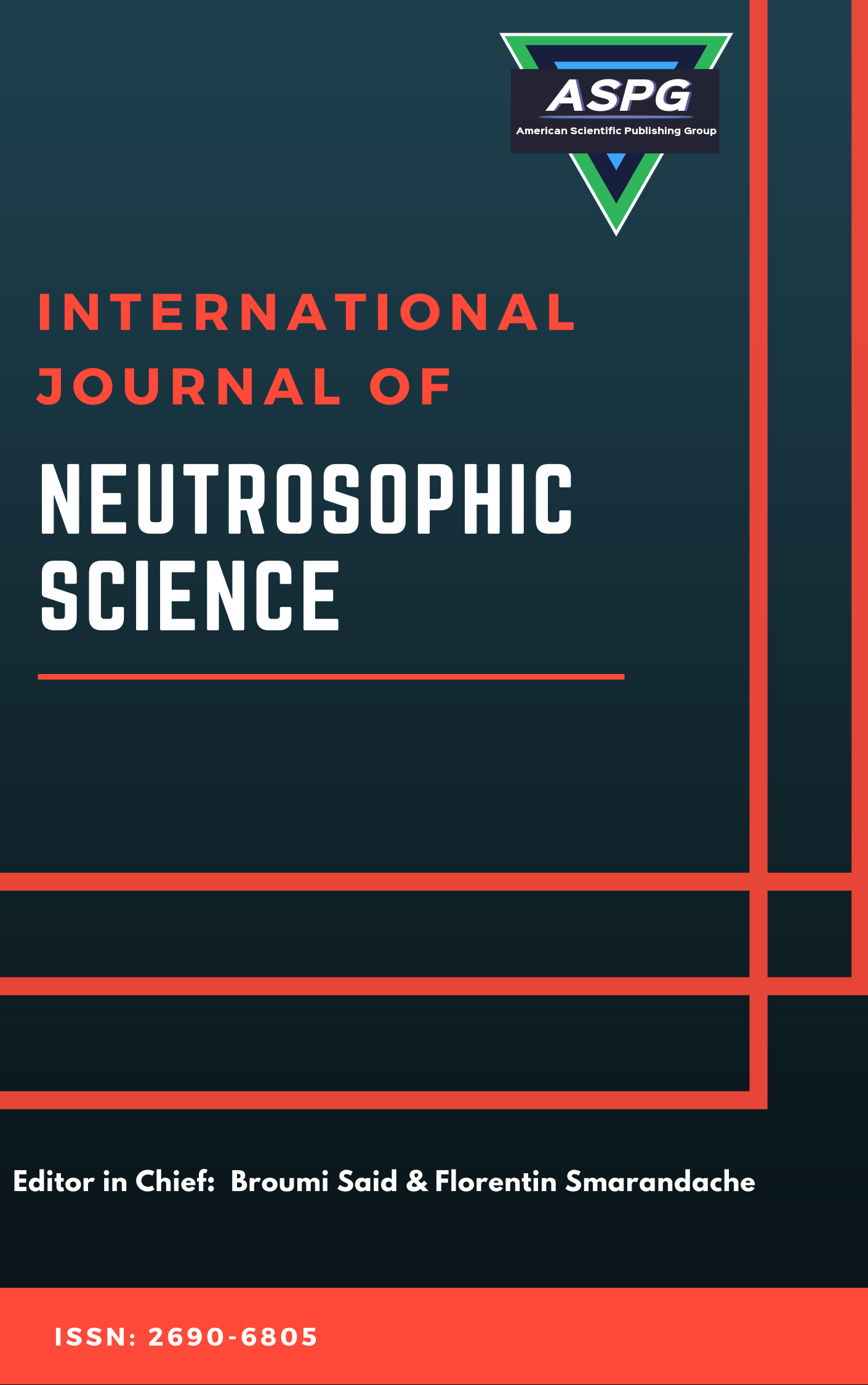

Volume 18 , Issue 4 , PP: 135-142, 2022 | Cite this article as | XML | Html | PDF | Full Length Article
Marco S. Salgado 1 * , Yaneth V. Torres 2 , Javier B. Remache 3
Doi: https://doi.org/10.54216/IJNS.180412
Every court is responsible for applying the law under the principles of fairness, justice, ethical-legal, and human value because it cannot be forgotten that every criminal is a human being. The foregoing is why the application of extenuating circumstances acquires a certain complexity. Currently, in Ecuador,certain situations cause mismanagement of justice due to a lack of understanding and assimilation of extenuating circumstances. Therefore, this is adopted as a problem situation, establishing as the main objective, to analyze the limiting factors in apply in extenuating circumstances using the 2-Tuple model in its neutrosophic extension.
extenuating circumstances , limiting factors , neutrosophic 2-tuple model
[1] A. J. Peñafiel Palacios, J. Estupiñán Ricardo, I. A. Cruz Piza, and M. E. España Herrería,
"Phenomenological hermeneutical method and neutrosophic cognitive maps in the causal analysis
of transgressions against the homeless," Neutrosophic sets and systems, vol. 44, no. 1, p. 18, 2021.
[2] I. X. León Rodríguez, J. A. Eras Diaz, and L. D. Pazmiño Salazar, "Analysis of Crimonogenic
Factors in Femicide Crimes," Neutrosophic Sets and Systems, vol. 37, pp. 90-98, 2020, doi:
10.5281/zenodo.4122027.
[3] J. L. R. Villafuerte, L. D. T. Torres, and L. T. Jimenez, "Neutrosophic Hypothesis to validate a
modification for Article 630 of the Integral Organic Criminal Code of Ecuador," Neutrosophic Sets
and Systems, vol. 37, no. 1, pp. 260-266, 2020.
[4] K. Pérez-Teruel, M. Leyva-Vázquez, and V. Estrada-Sentí, "Mental models consensus process
using fuzzy cognitive maps and computing with words," Ingenieria y Universidad, vol. 19, no. 1,
pp. 173-188, 2015, doi: 10.11144/Javeriana.iyu19-1.mmcp.
[5] R. M. Zulqarnain, X. Long-Xin, B. Ali, S. Broumi, S. Abdal, and M. I. Ahamad, "Decision-Making
Approach Based on Correlation Coefficient with its Properties Under Interval-Valued Neutrosophic
hypersoft set environment," Neutrosophic Sets and Systems,, vol. 40, pp. 12-28, 2021.
[6] M. Zhao, G. Wei, J. Wu, Y. Guo, and C. Wei, "TODIM method for multiple attribute group
decision making based on cumulative prospect theory with 2-tuple linguistic neutrosophic sets,"
International Journal of Intelligent Systems,, vol. 36, pp. 1199-1222, 2021.
[7] S. Şahin, A. Kargın, and M. Yücel, "Hausdorff Measures on Generalized Set alued Neutrosophic
Quadruple Numbers and Decision Making Applications for Adequacy of Online Education,"
Neutrosophic Sets and Systems,, vol. 40, pp. 86-116, 2021.
[8] J. T. Rickard, J. Aisbett, and R. R. Yager, "Computing With Words in fuzzy cognitive maps," in
Fuzzy Information Processing Society (NAFIPS) held jointly with 2015 5th World Conference on
Soft Computing (WConSC), 2015 Annual Conference of the North American, 2015, 2015: IEEE, pp.
1-6.
[9] J. Estupiñán Ricardo, J. J. Domínguez Menéndez, I. F. Barcos Arias, J. M. Macías Bermúdez, and
N. Moreno Lemus, "Neutrosophic K-means for the analysis of earthquake data in Ecuador,"
Neutrosophic Sets and Systems, vol. 44, no. 1, p. 29, 2021.
[10] J. E. Ricardo, Z. M. M. Rosado, E. K. C. Pataron, and V. Y. V. Vargas, "Measuring legal and
socioeconomic effect of the declared debtors usign the ahp technique in a neutrosophic framework,"
Neutrosophic Sets and Systems, vol. 44, pp. 357-366, 2021.
[11] F. Smarandache, M. A. Quiroz-Martínez, J. E. Ricardo, N. B. Hernández, and M. Y. L. Vázquez,
"Application of neutrosophic offsets for digital image processing," Investigacion Operacional, vol.
41, no. 5, pp. 603-611, 2020.
[12] E. G. Caballero, F. Smarandache, and M. L. Vázquez, "On neutrosophic offuninorms," Symmetry,
vol. 11, no. 9, 2019, Art no. 1136, doi: 10.3390/sym11091136.
[13] F. Smarandache, M. A. Quiroz-Martínez, J. E. Ricardo, N. B. Hernández, and M. Y. Leyva
Vázquez, "Application of neutrosophic offsets for digital image processing," Investigacion
Operacional, vol. 41, no. 5, pp. 603-611, 2020. [Online]. Available:
https://www.scopus.com/inward/record.uri?eid=2-s2.0-
85089004744&partnerID=40&md5=bd234439436af471c84f5c133b14709d.
[14] F. Herrera and E. H. Viedma, "Linguistic decision analysis: Steps for solving decision problems
under linguistic information," Fuzzy Sets and Systems,, vol. 115, pp. 67-82, 2000.
[15] V. M. P. Carvajal, M. T. M. Valverde, and R. A. Pután, "A neutrosophic linguistic model for
internal control evaluation to an Ecuadorian Company," Neutrosophic Sets and Systems,, vol. 34,
pp. 169-176, 2020.
[16] J. Wang, J. Lu, G. Wei, R. Lin, and C. Wei, "Models for MADM with single-valued neutrosophic 2-
tuple linguistic Muirhead mean operators," Mathematics,, vol. 7, p. 442, 2019.
[17] M. Edmerdash and E. Rushdy, "An Efficient Framework for Drug Product Selection–DPS
according to Neutrosophic BWM, MABAC and PROMETHEE II Methods," Neutrosophic Sets and
Systems, vol. 45, pp. 286-305, 2021.
[18] F. Smarandache, M. Colhon, Ş. lăduţescu, and X. Negrea, "Word-level neutrosophic sentiment
similarity," Applied Soft Computing, vol. 80, pp. 167-176, 2019/07/01/ 2019, doi:
https://doi.org/10.1016/j.asoc.2019.03.034.